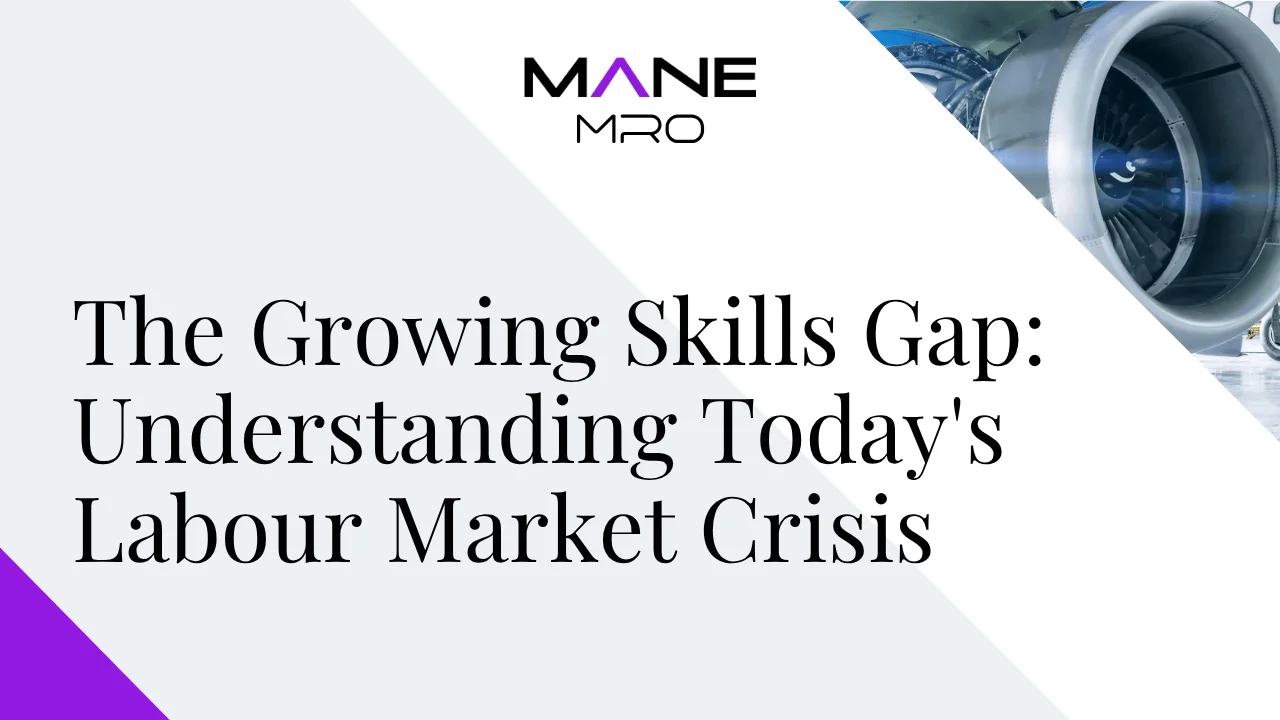The Growing Skills Gap: Understanding Today's Labour Market Crisis
30 Oct, 20254 minsThe MRO (Maintenance, Repair, and Operations) sector is experiencing an unprecedented labour...

The MRO (Maintenance, Repair, and Operations) sector is experiencing an unprecedented labour shortage that spans multiple specialties and regions, creating significant challenges for aviation, manufacturing, and industrial maintenance organisations worldwide. This crisis, characterised by a widening gap between available technical positions and qualified maintenance professionals, has become particularly acute in the post-pandemic landscape. The situation demands urgent attention as MRO organisations struggle to maintain critical maintenance operations and growth while facing severe staffing constraints.
The MRO labour shortage phenomenon represents a complex interplay of demographic shifts, evolving technical skill requirements, and changing workforce expectations. Recent data from industry analysts reveals that MRO job vacancies remained consistently high throughout 2023, despite economic uncertainties. Similar patterns are evident across global maintenance sectors, suggesting a structural rather than cyclical challenge in technical workforce availability.
Key Drivers of the Current Labour Crisis
The roots of today's MRO labour shortages can be traced to several interconnected factors that have evolved over decades. An ageing workforce represents one of the most significant challenges, with many maintenance operations facing a wave of retirements among experienced technicians and engineers. In the MRO sector alone, nearly 35% of skilled maintenance professionals are expected to retire within the next five years, taking valuable technical expertise and institutional knowledge with them.
The skills mismatch between available maintenance workers and job requirements has become increasingly pronounced. Traditional technical education and training programmes have struggled to keep pace with rapidly evolving maintenance technology and industrial requirements. This gap is particularly evident in aerospace MRO, industrial maintenance, and advanced manufacturing maintenance, where specific technical certifications and expertise are crucial.
Additionally, the pandemic has accelerated changes in worker preferences and expectations. Many individuals now prioritise work-life balance, flexible arrangements, and meaningful work over traditional career paths. This shift has created additional challenges for industries that rely on conventional working patterns or physical presence.
Sector-Specific Impacts and Challenges
Different segments within the MRO sector experience labour shortages in unique ways, though some commonalities exist. The aerospace MRO sector faces critical staffing shortages, with major maintenance facilities reporting significant backlogs due to workforce constraints. The industrial maintenance sector struggles with an ageing workforce and difficulties attracting younger technicians, while specialised equipment maintenance grapples with an insufficient pipeline of qualified professionals in emerging technologies and automated systems.
Manufacturing maintenance and facilities management have been particularly hard hit, with businesses reporting significant operational disruptions due to maintenance staffing shortages. The situation is compounded by Brexit-related changes in workforce mobility, affecting maintenance operations that historically relied on EU workers. These challenges have led to increased maintenance costs and reduced capacity across various industrial sectors.
The Impact on Hiring
The current MRO labour market conditions have fundamentally transformed technical recruitment practices and talent acquisition strategies. Maintenance organisations are being forced to reimagine their approach to hiring, retention, and workforce development. Traditional technical recruitment methods are proving insufficient in addressing the scale and complexity of current maintenance staffing challenges.
Human resource departments are adapting by implementing more flexible technical qualification criteria, emphasising mechanical aptitude over extensive experience, and investing in specialised training programmes to develop maintenance talent internally. Employer branding has become increasingly crucial, with MRO companies working to differentiate themselves in a competitive market for technical talent.
Recruitment strategies now frequently include:
- Enhanced benefits packages and competitive compensation
- Flexible working arrangements and improved work-life balance initiatives
- Career development opportunities and clear progression paths
- Investment in technology to streamline hiring processes
- Partnerships with educational institutions for talent pipeline development
Solutions and Opportunities
While the MRO labour shortage presents significant challenges, it also creates opportunities for innovation in technical workforce development and management. Progressive maintenance organisations are implementing various solutions to address these challenges:
- Technical Skills Development and Training: Maintenance organisations are investing more heavily in technical upskilling and reskilling programmes, recognising the need to develop maintenance talent internally rather than relying solely on external recruitment. This includes technical apprenticeships, mentoring programmes, and partnerships with technical training institutions.
- Technology Integration: Automation and artificial intelligence are being deployed to augment human capabilities rather than replace workers entirely. This approach helps organisations maintain productivity while making better use of available human resources.
- Flexible Working Models: Companies are adopting more flexible working arrangements, including hybrid models and alternative scheduling options, to attract and retain talent from diverse demographic groups.
Looking Ahead: Future Workforce Trends
The future of MRO work will likely be shaped by how maintenance organisations respond to current labour market challenges. Several key trends are emerging that will influence technical workforce development and management:
- Digital Transformation: The acceleration of digital transformation in maintenance technologies will continue to create new technical roles while making others obsolete. This evolution requires continuous adaptation in MRO workforce planning and development strategies.
- Demographic Shifts: As populations age in developed economies, organisations must prepare for continued challenges in workforce replacement and knowledge transfer. This may lead to increased focus on retention strategies for older workers while developing new talent.
- Skills Evolution: The rapid pace of technological change in maintenance systems means that technical skills requirements will continue to evolve quickly. MRO organisations must build agility into their workforce planning and development strategies to remain competitive.
The MRO labour shortage crisis requires a coordinated response from maintenance organisations, technical training institutions, and industry policymakers. Success in addressing these challenges will depend on organisations' ability to adapt their approach to technical talent acquisition, development, and retention while embracing new ways of maintaining and managing their workforce.
Organisations that can effectively navigate these challenges while building resilient, adaptable MRO workforce strategies will be better positioned for success in an increasingly competitive maintenance sector. The focus must remain on developing sustainable solutions that address both immediate technical staffing needs and long-term maintenance workforce development goals.



